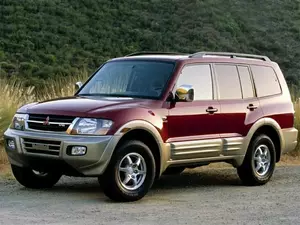
| Engine | 0—60 mph | 0—100 km/h | Top Speed | Averange Economy |
|---|---|---|---|---|
| 3.2 DI-DC | 10.5 s | 11.1 s | 112 mph | 25 mpg |
| Engine | 3.2 DI-DC |
|---|---|
| 0—60 mph | 10.5 s |
| 0—100 km/h | 11.1 s |
| Top Speed | 112 mph |
| Averange Economy | 25 mpg |
In 2015 Mitsubishi Pajero 0-60 acceleration was 10.5 seconds.
Mitsubishi Pajero 0-60 mph was up to 10% slower in 2015 than world's average.
In 2015, Mitsubishi Pajero 0-60 mph to car weight ratio is shown below:
| Vehicle | Acceleration 0—60 mph (0—100 km/h) | Maximum speed | Acceleration to passenger ratio | Fuel consumption at high speed | Fuel type / gearbox |
|---|---|---|---|---|---|
| 3.2 DI-DC | 10.5 s to 60 mph (11.1 s to 100 km/h) | 112 mph (180 km/h) | 1.5 s to 60 mph / person | 27 mpg (8.6 L per 100 km) | Diesel / 5 |
| Vehicle | 3.2 DI-DC |
|---|---|
| Acceleration 0-60 mph (0-100 km/h) | 10.5 s to 60 mph (11.1 s to 100 km/h) |
| Maximum speed | 112 mph (180 km/h) |
| Acceleration to passenger ratio | 1.5 s to 60 mph / person |
| Fuel consumption at high speed | 27 mpg (8.6 L per 100 km) |
| Fuel type / gearbox | Diesel / 5 |

| Engine | 0—60 mph | 0—100 km/h | Top Speed | Averange Economy |
|---|---|---|---|---|
| 3.2 DI-DC | 9.2 s | 9.7 s | 112 mph | 30 mpg |
| Engine | 3.2 DI-DC |
|---|---|
| 0—60 mph | 9.2 s |
| 0—100 km/h | 9.7 s |
| Top Speed | 112 mph |
| Averange Economy | 30 mpg |
In 2012 Mitsubishi Pajero 0-60 acceleration was 9.2 seconds.
Mitsubishi Pajero 0-60 mph was up to 3% faster in 2012 than world's average.
In 2012, Mitsubishi Pajero 0-60 mph to car weight ratio is shown below:
| Vehicle | Acceleration 0—60 mph (0—100 km/h) | Maximum speed | Acceleration to passenger ratio | Fuel consumption at high speed | Fuel type / gearbox |
|---|---|---|---|---|---|
| 3.2 DI-DC | 9.2 s to 60 mph (9.7 s to 100 km/h) | 112 mph (180 km/h) | 4.6 s to 60 mph / person | 34 mpg (6.9 L per 100 km) | Diesel |
| Vehicle | 3.2 DI-DC |
|---|---|
| Acceleration 0-60 mph (0-100 km/h) | 9.2 s to 60 mph (9.7 s to 100 km/h) |
| Maximum speed | 112 mph (180 km/h) |
| Acceleration to passenger ratio | 4.6 s to 60 mph / person |
| Fuel consumption at high speed | 34 mpg (6.9 L per 100 km) |
| Fuel type / gearbox | Diesel |

| Engine | 0—60 mph | 0—100 km/h | Top Speed | Averange Economy |
|---|---|---|---|---|
| 3.0 V6 | 10.7 s | 11.3 s | 111 mph | - |
| 3.2 TD | 9.9 s | 10.4 s | 108 mph | 30 mpg |
| Engine | 3.0 V6 |
|---|---|
| 0—60 mph | 10.7 s |
| 0—100 km/h | 11.3 s |
| Top Speed | 111 mph |
| Averange Economy | - |
| Engine | 3.2 TD |
| 0—60 mph | 9.9 s |
| 0—100 km/h | 10.4 s |
| Top Speed | 108 mph |
| Averange Economy | 30 mpg |
In 2008, Mitsubishi Pajero 0-60 acceleration was between 9.9 and 10.7 seconds.
Mitsubishi Pajero 0-60 mph was up to 12% slower in 2008 than world's average.
In 2008, Mitsubishi Pajero 0-60 mph to car weight ratio is shown below:
| Vehicle | Acceleration 0—60 mph (0—100 km/h) | Maximum speed | Acceleration to passenger ratio | Fuel consumption at high speed | Fuel type / gearbox |
|---|---|---|---|---|---|
| 3.0 V6 | 10.7 s to 60 mph (11.3 s to 100 km/h) | 111 mph (179 km/h) | 2.1 s to 60 mph / person | - | Petrol (Gasoline) / 5 |
| 3.2 TD | 9.9 s to 60 mph (10.4 s to 100 km/h) | 108 mph (174 km/h) | 2 s to 60 mph / person | 37 mpg (6.4 L per 100 km) | Diesel |
| Vehicle | 3.0 V6 |
|---|---|
| Acceleration 0-60 mph (0-100 km/h) | 10.7 s to 60 mph (11.3 s to 100 km/h) |
| Maximum speed | 111 mph (179 km/h) |
| Acceleration to passenger ratio | 2.1 s to 60 mph / person |
| Fuel consumption at high speed | - |
| Fuel type / gearbox | Petrol (Gasoline) / 5 |
| Vehicle | 3.2 TD |
| Acceleration 0-60 mph (0-100 km/h) | 9.9 s to 60 mph (10.4 s to 100 km/h) |
| Maximum speed | 108 mph (174 km/h) |
| Acceleration to passenger ratio | 2 s to 60 mph / person |
| Fuel consumption at high speed | 37 mpg (6.4 L per 100 km) |
| Fuel type / gearbox | Diesel |

| Engine | 0—60 mph | 0—100 km/h | Top Speed | Averange Economy |
|---|---|---|---|---|
| 3.8 i V6 24V MIVEC | 10.3 s | 10.8 s | 124 mph | 17 mpg |
| 3.2 Di-DC | 12.5 s | 13.2 s | 110 mph | 20 mpg |
| Engine | 3.8 i V6 24V MIVEC |
|---|---|
| 0—60 mph | 10.3 s |
| 0—100 km/h | 10.8 s |
| Top Speed | 124 mph |
| Averange Economy | 17 mpg |
| Engine | 3.2 Di-DC |
| 0—60 mph | 12.5 s |
| 0—100 km/h | 13.2 s |
| Top Speed | 110 mph |
| Averange Economy | 20 mpg |
In 2006, Mitsubishi Pajero 0-60 acceleration was between 10.3 and 12.5 seconds.
Mitsubishi Pajero 0-60 mph was up to 31% slower in 2006 than world's average.
In 2006, Mitsubishi Pajero 0-60 mph to car weight ratio is shown below:
| Vehicle | Acceleration 0—60 mph (0—100 km/h) | Maximum speed | Acceleration to passenger ratio | Fuel consumption at high speed | Fuel type / gearbox |
|---|---|---|---|---|---|
| 3.8 i V6 24V MIVEC | 10.3 s to 60 mph (10.8 s to 100 km/h) | 124 mph (200 km/h) | 1.5 s to 60 mph / person | 21 mpg (11.2 L per 100 km) | Petrol (Gasoline) / 5 |
| 3.2 Di-DC | 12.5 s to 60 mph (13.2 s to 100 km/h) | 110 mph (177 km/h) | 1.8 s to 60 mph / person | 26 mpg (9 L per 100 km) | Diesel / 5 |
| Vehicle | 3.8 i V6 24V MIVEC |
|---|---|
| Acceleration 0-60 mph (0-100 km/h) | 10.3 s to 60 mph (10.8 s to 100 km/h) |
| Maximum speed | 124 mph (200 km/h) |
| Acceleration to passenger ratio | 1.5 s to 60 mph / person |
| Fuel consumption at high speed | 21 mpg (11.2 L per 100 km) |
| Fuel type / gearbox | Petrol (Gasoline) / 5 |
| Vehicle | 3.2 Di-DC |
| Acceleration 0-60 mph (0-100 km/h) | 12.5 s to 60 mph (13.2 s to 100 km/h) |
| Maximum speed | 110 mph (177 km/h) |
| Acceleration to passenger ratio | 1.8 s to 60 mph / person |
| Fuel consumption at high speed | 26 mpg (9 L per 100 km) |
| Fuel type / gearbox | Diesel / 5 |

| Engine | 0—60 mph | 0—100 km/h | Top Speed | Averange Economy |
|---|---|---|---|---|
| 3.2 DI-D | 10.9 s | 11.5 s | 106 mph | 25 mpg |
| 3.5 V6 GDI | 10.2 s | 10.7 s | 118 mph | 17 mpg |
| 2.5 TD | 17.3 s | 18.2 s | 93 mph | - |
| Engine | 3.2 DI-D |
|---|---|
| 0—60 mph | 10.9 s |
| 0—100 km/h | 11.5 s |
| Top Speed | 106 mph |
| Averange Economy | 25 mpg |
| Engine | 3.5 V6 GDI |
| 0—60 mph | 10.2 s |
| 0—100 km/h | 10.7 s |
| Top Speed | 118 mph |
| Averange Economy | 17 mpg |
| Engine | 2.5 TD |
| 0—60 mph | 17.3 s |
| 0—100 km/h | 18.2 s |
| Top Speed | 93 mph |
| Averange Economy | - |
In 2001, Mitsubishi Pajero 0-60 acceleration was between 10.2 and 17.3 seconds.
Mitsubishi Pajero 0-60 mph was up to 82% slower in 2001 than world's average.
In 2001, Mitsubishi Pajero 0-60 mph to car weight ratio is shown below:
| Vehicle | Acceleration 0—60 mph (0—100 km/h) | Maximum speed | Acceleration to passenger ratio | Fuel consumption at high speed | Fuel type / gearbox |
|---|---|---|---|---|---|
| 3.2 DI-D | 10.9 s to 60 mph (11.5 s to 100 km/h) | 106 mph (170 km/h) | 2.2 s to 60 mph / person | 30 mpg (7.9 L per 100 km) | Diesel |
| 3.5 V6 GDI | 10.2 s to 60 mph (10.7 s to 100 km/h) | 118 mph (190 km/h) | 1.5 s to 60 mph / person | 21 mpg (11.1 L per 100 km) | Petrol (Gasoline) / 5 |
| 2.5 TD | 17.3 s to 60 mph (18.2 s to 100 km/h) | 93 mph (150 km/h) | 3.5 s to 60 mph / person | 26 mpg (9.1 L per 100 km) | Diesel |
| Vehicle | 3.2 DI-D |
|---|---|
| Acceleration 0-60 mph (0-100 km/h) | 10.9 s to 60 mph (11.5 s to 100 km/h) |
| Maximum speed | 106 mph (170 km/h) |
| Acceleration to passenger ratio | 2.2 s to 60 mph / person |
| Fuel consumption at high speed | 30 mpg (7.9 L per 100 km) |
| Fuel type / gearbox | Diesel |
| Vehicle | 3.5 V6 GDI |
| Acceleration 0-60 mph (0-100 km/h) | 10.2 s to 60 mph (10.7 s to 100 km/h) |
| Maximum speed | 118 mph (190 km/h) |
| Acceleration to passenger ratio | 1.5 s to 60 mph / person |
| Fuel consumption at high speed | 21 mpg (11.1 L per 100 km) |
| Fuel type / gearbox | Petrol (Gasoline) / 5 |
| Vehicle | 2.5 TD |
| Acceleration 0-60 mph (0-100 km/h) | 17.3 s to 60 mph (18.2 s to 100 km/h) |
| Maximum speed | 93 mph (150 km/h) |
| Acceleration to passenger ratio | 3.5 s to 60 mph / person |
| Fuel consumption at high speed | 26 mpg (9.1 L per 100 km) |
| Fuel type / gearbox | Diesel |

| Engine | 0—60 mph | 0—100 km/h | Top Speed | Averange Economy |
|---|---|---|---|---|
| 2.0 GDI 16V | 9.7 s | 10.2 s | 106 mph | 25 mpg |
| 1.8 i 16V | 11.3 s | 11.9 s | 96 mph | 25 mpg |
| 1.8 GDI | 9.7 s | 10.2 s | 104 mph | - |
| Engine | 2.0 GDI 16V |
|---|---|
| 0—60 mph | 9.7 s |
| 0—100 km/h | 10.2 s |
| Top Speed | 106 mph |
| Averange Economy | 25 mpg |
| Engine | 1.8 i 16V |
| 0—60 mph | 11.3 s |
| 0—100 km/h | 11.9 s |
| Top Speed | 96 mph |
| Averange Economy | 25 mpg |
| Engine | 1.8 GDI |
| 0—60 mph | 9.7 s |
| 0—100 km/h | 10.2 s |
| Top Speed | 104 mph |
| Averange Economy | - |
In 1998, Mitsubishi Pajero 0-60 acceleration was between 9.7 and 11.3 seconds.
Mitsubishi Pajero 0-60 mph was up to 19% slower in 1998 than world's average.
In 1998, Mitsubishi Pajero 0-60 mph to car weight ratio is shown below:
| Vehicle | Acceleration 0—60 mph (0—100 km/h) | Maximum speed | Acceleration to passenger ratio | Fuel consumption at high speed | Fuel type / gearbox |
|---|---|---|---|---|---|
| 2.0 GDI 16V | 9.7 s to 60 mph (10.2 s to 100 km/h) | 106 mph (170 km/h) | 1.9 s to 60 mph / person | 30 mpg (7.8 L per 100 km) | Petrol (Gasoline) |
| 1.8 i 16V | 11.3 s to 60 mph (11.9 s to 100 km/h) | 96 mph (155 km/h) | 2.3 s to 60 mph / person | 30 mpg (7.9 L per 100 km) | Petrol (Gasoline) |
| 1.8 GDI | 9.7 s to 60 mph (10.2 s to 100 km/h) | 104 mph (168 km/h) | 2.4 s to 60 mph / person | 31 mpg (7.7 L per 100 km) | Petrol (Gasoline) |
| Vehicle | 2.0 GDI 16V |
|---|---|
| Acceleration 0-60 mph (0-100 km/h) | 9.7 s to 60 mph (10.2 s to 100 km/h) |
| Maximum speed | 106 mph (170 km/h) |
| Acceleration to passenger ratio | 1.9 s to 60 mph / person |
| Fuel consumption at high speed | 30 mpg (7.8 L per 100 km) |
| Fuel type / gearbox | Petrol (Gasoline) |
| Vehicle | 1.8 i 16V |
| Acceleration 0-60 mph (0-100 km/h) | 11.3 s to 60 mph (11.9 s to 100 km/h) |
| Maximum speed | 96 mph (155 km/h) |
| Acceleration to passenger ratio | 2.3 s to 60 mph / person |
| Fuel consumption at high speed | 30 mpg (7.9 L per 100 km) |
| Fuel type / gearbox | Petrol (Gasoline) |
| Vehicle | 1.8 GDI |
| Acceleration 0-60 mph (0-100 km/h) | 9.7 s to 60 mph (10.2 s to 100 km/h) |
| Maximum speed | 104 mph (168 km/h) |
| Acceleration to passenger ratio | 2.4 s to 60 mph / person |
| Fuel consumption at high speed | 31 mpg (7.7 L per 100 km) |
| Fuel type / gearbox | Petrol (Gasoline) |

| Engine | 0—60 mph | 0—100 km/h | Top Speed | Averange Economy |
|---|---|---|---|---|
| 3.0 i V6 24V | 13.7 s | 14.4 s | 109 mph | - |
| 2.5 TD | 17.6 s | 18.5 s | 93 mph | - |
| 2.5 TD | 17.1 s | 18 s | 94 mph | - |
| Engine | 3.0 i V6 24V |
|---|---|
| 0—60 mph | 13.7 s |
| 0—100 km/h | 14.4 s |
| Top Speed | 109 mph |
| Averange Economy | - |
| Engine | 2.5 TD |
| 0—60 mph | 17.6 s |
| 0—100 km/h | 18.5 s |
| Top Speed | 93 mph |
| Averange Economy | - |
| Engine | 2.5 TD |
| 0—60 mph | 17.1 s |
| 0—100 km/h | 18 s |
| Top Speed | 94 mph |
| Averange Economy | - |
In 1996, Mitsubishi Pajero 0-60 acceleration was between 13.7 and 17.6 seconds.
Mitsubishi Pajero 0-60 mph was up to 85% slower in 1996 than world's average.
In 1996, Mitsubishi Pajero 0-60 mph to car weight ratio is shown below:
| Vehicle | Acceleration 0—60 mph (0—100 km/h) | Maximum speed | Acceleration to passenger ratio | Fuel consumption at high speed | Fuel type / gearbox |
|---|---|---|---|---|---|
| 3.0 i V6 24V | 13.7 s to 60 mph (14.4 s to 100 km/h) | 109 mph (175 km/h) | 2.7 s to 60 mph / person | 23 mpg (10.3 L per 100 km) | Petrol (Gasoline) / 4 |
| 2.5 TD | 17.6 s to 60 mph (18.5 s to 100 km/h) | 93 mph (150 km/h) | 3.5 s to 60 mph / person | 26 mpg (9 L per 100 km) | Diesel |
| 2.5 TD | 17.1 s to 60 mph (18 s to 100 km/h) | 94 mph (151 km/h) | 3.4 s to 60 mph / person | 27 mpg (8.8 L per 100 km) | Diesel |
| Vehicle | 3.0 i V6 24V |
|---|---|
| Acceleration 0-60 mph (0-100 km/h) | 13.7 s to 60 mph (14.4 s to 100 km/h) |
| Maximum speed | 109 mph (175 km/h) |
| Acceleration to passenger ratio | 2.7 s to 60 mph / person |
| Fuel consumption at high speed | 23 mpg (10.3 L per 100 km) |
| Fuel type / gearbox | Petrol (Gasoline) / 4 |
| Vehicle | 2.5 TD |
| Acceleration 0-60 mph (0-100 km/h) | 17.6 s to 60 mph (18.5 s to 100 km/h) |
| Maximum speed | 93 mph (150 km/h) |
| Acceleration to passenger ratio | 3.5 s to 60 mph / person |
| Fuel consumption at high speed | 26 mpg (9 L per 100 km) |
| Fuel type / gearbox | Diesel |
| Vehicle | 2.5 TD |
| Acceleration 0-60 mph (0-100 km/h) | 17.1 s to 60 mph (18 s to 100 km/h) |
| Maximum speed | 94 mph (151 km/h) |
| Acceleration to passenger ratio | 3.4 s to 60 mph / person |
| Fuel consumption at high speed | 27 mpg (8.8 L per 100 km) |
| Fuel type / gearbox | Diesel |

| Engine | 0—60 mph | 0—100 km/h | Top Speed | Averange Economy |
|---|---|---|---|---|
| 3.5 i V6 24V | 10 s | 10.5 s | 115 mph | 16 mpg |
| 2.5 TD GL | 20.4 s | 21.5 s | 90 mph | 21 mpg |
| 3.0 i V6 24V | 11.5 s | 12.1 s | 109 mph | 17 mpg |
| 3.0 i V6 GLS | 13.3 s | 14 s | 103 mph | 17 mpg |
| 2.8 TD GLX | 16.4 s | 17.3 s | 93 mph | 19 mpg |
| 3.0 i V6 24V GLS | 11.5 s | 12.1 s | 109 mph | - |
| 3.5 i V6 24V GLS | 10.7 s | 11.3 s | 115 mph | - |
| 3.5 i V6 24V GDI | 9.5 s | 10 s | 118 mph | - |
| Engine | 3.5 i V6 24V |
|---|---|
| 0—60 mph | 10 s |
| 0—100 km/h | 10.5 s |
| Top Speed | 115 mph |
| Averange Economy | 16 mpg |
| Engine | 2.5 TD GL |
| 0—60 mph | 20.4 s |
| 0—100 km/h | 21.5 s |
| Top Speed | 90 mph |
| Averange Economy | 21 mpg |
| Engine | 3.0 i V6 24V |
| 0—60 mph | 11.5 s |
| 0—100 km/h | 12.1 s |
| Top Speed | 109 mph |
| Averange Economy | 17 mpg |
| Engine | 3.0 i V6 GLS |
| 0—60 mph | 13.3 s |
| 0—100 km/h | 14 s |
| Top Speed | 103 mph |
| Averange Economy | 17 mpg |
| Engine | 2.8 TD GLX |
| 0—60 mph | 16.4 s |
| 0—100 km/h | 17.3 s |
| Top Speed | 93 mph |
| Averange Economy | 19 mpg |
| Engine | 3.0 i V6 24V GLS |
| 0—60 mph | 11.5 s |
| 0—100 km/h | 12.1 s |
| Top Speed | 109 mph |
| Averange Economy | - |
| Engine | 3.5 i V6 24V GLS |
| 0—60 mph | 10.7 s |
| 0—100 km/h | 11.3 s |
| Top Speed | 115 mph |
| Averange Economy | - |
| Engine | 3.5 i V6 24V GDI |
| 0—60 mph | 9.5 s |
| 0—100 km/h | 10 s |
| Top Speed | 118 mph |
| Averange Economy | - |
In 1991, Mitsubishi Pajero 0-60 acceleration was between 9.5 and 20.4 seconds.
Mitsubishi Pajero 0-60 mph was up to 114% slower in 1991 than world's average.
In 1991, Mitsubishi Pajero 0-60 mph to car weight ratio is shown below:
| Vehicle | Acceleration 0—60 mph (0—100 km/h) | Maximum speed | Acceleration to passenger ratio | Fuel consumption at high speed | Fuel type / gearbox |
|---|---|---|---|---|---|
| 3.5 i V6 24V | 10 s to 60 mph (10.5 s to 100 km/h) | 115 mph (185 km/h) | 1.4 s to 60 mph / person | - | Petrol (Gasoline) |
| 2.5 TD GL | 20.4 s to 60 mph (21.5 s to 100 km/h) | 90 mph (145 km/h) | 2.9 s to 60 mph / person | 27 mpg (8.6 L per 100 km) | Diesel |
| 3.0 i V6 24V | 11.5 s to 60 mph (12.1 s to 100 km/h) | 109 mph (175 km/h) | 1.6 s to 60 mph / person | - | Petrol (Gasoline) |
| 3.0 i V6 GLS | 13.3 s to 60 mph (14 s to 100 km/h) | 103 mph (165 km/h) | 1.9 s to 60 mph / person | - | Petrol (Gasoline) |
| 2.8 TD GLX | 16.4 s to 60 mph (17.3 s to 100 km/h) | 93 mph (150 km/h) | 3.3 s to 60 mph / person | 24 mpg (9.7 L per 100 km) | Diesel |
| 3.0 i V6 24V GLS | 11.5 s to 60 mph (12.1 s to 100 km/h) | 109 mph (175 km/h) | 2.3 s to 60 mph / person | 22 mpg (10.8 L per 100 km) | Petrol (Gasoline) |
| 3.5 i V6 24V GLS | 10.7 s to 60 mph (11.3 s to 100 km/h) | 115 mph (185 km/h) | 1.5 s to 60 mph / person | 21 mpg (11.1 L per 100 km) | Petrol (Gasoline) |
| 3.5 i V6 24V GDI | 9.5 s to 60 mph (10 s to 100 km/h) | 118 mph (190 km/h) | 1.4 s to 60 mph / person | 24 mpg (10 L per 100 km) | Petrol (Gasoline) / 5 |
| Vehicle | 3.5 i V6 24V |
|---|---|
| Acceleration 0-60 mph (0-100 km/h) | 10 s to 60 mph (10.5 s to 100 km/h) |
| Maximum speed | 115 mph (185 km/h) |
| Acceleration to passenger ratio | 1.4 s to 60 mph / person |
| Fuel consumption at high speed | - |
| Fuel type / gearbox | Petrol (Gasoline) |
| Vehicle | 2.5 TD GL |
| Acceleration 0-60 mph (0-100 km/h) | 20.4 s to 60 mph (21.5 s to 100 km/h) |
| Maximum speed | 90 mph (145 km/h) |
| Acceleration to passenger ratio | 2.9 s to 60 mph / person |
| Fuel consumption at high speed | 27 mpg (8.6 L per 100 km) |
| Fuel type / gearbox | Diesel |
| Vehicle | 3.0 i V6 24V |
| Acceleration 0-60 mph (0-100 km/h) | 11.5 s to 60 mph (12.1 s to 100 km/h) |
| Maximum speed | 109 mph (175 km/h) |
| Acceleration to passenger ratio | 1.6 s to 60 mph / person |
| Fuel consumption at high speed | - |
| Fuel type / gearbox | Petrol (Gasoline) |
| Vehicle | 3.0 i V6 GLS |
| Acceleration 0-60 mph (0-100 km/h) | 13.3 s to 60 mph (14 s to 100 km/h) |
| Maximum speed | 103 mph (165 km/h) |
| Acceleration to passenger ratio | 1.9 s to 60 mph / person |
| Fuel consumption at high speed | - |
| Fuel type / gearbox | Petrol (Gasoline) |
| Vehicle | 2.8 TD GLX |
| Acceleration 0-60 mph (0-100 km/h) | 16.4 s to 60 mph (17.3 s to 100 km/h) |
| Maximum speed | 93 mph (150 km/h) |
| Acceleration to passenger ratio | 3.3 s to 60 mph / person |
| Fuel consumption at high speed | 24 mpg (9.7 L per 100 km) |
| Fuel type / gearbox | Diesel |
| Vehicle | 3.0 i V6 24V GLS |
| Acceleration 0-60 mph (0-100 km/h) | 11.5 s to 60 mph (12.1 s to 100 km/h) |
| Maximum speed | 109 mph (175 km/h) |
| Acceleration to passenger ratio | 2.3 s to 60 mph / person |
| Fuel consumption at high speed | 22 mpg (10.8 L per 100 km) |
| Fuel type / gearbox | Petrol (Gasoline) |
| Vehicle | 3.5 i V6 24V GLS |
| Acceleration 0-60 mph (0-100 km/h) | 10.7 s to 60 mph (11.3 s to 100 km/h) |
| Maximum speed | 115 mph (185 km/h) |
| Acceleration to passenger ratio | 1.5 s to 60 mph / person |
| Fuel consumption at high speed | 21 mpg (11.1 L per 100 km) |
| Fuel type / gearbox | Petrol (Gasoline) |
| Vehicle | 3.5 i V6 24V GDI |
| Acceleration 0-60 mph (0-100 km/h) | 9.5 s to 60 mph (10 s to 100 km/h) |
| Maximum speed | 118 mph (190 km/h) |
| Acceleration to passenger ratio | 1.4 s to 60 mph / person |
| Fuel consumption at high speed | 24 mpg (10 L per 100 km) |
| Fuel type / gearbox | Petrol (Gasoline) / 5 |

| Engine | 0—60 mph | 0—100 km/h | Top Speed | Averange Economy |
|---|---|---|---|---|
| 3.5 i V6 24V | 9 s | 9.5 s | 0 mph | 17 mpg |
| 3.0 i V6 24V GLS | 11.9 s | 12.5 s | 103 mph | 17 mpg |
| 2.5 TD GL | 15.6 s | 16.4 s | 90 mph | - |
| 3.5 i V6 24V GDI | 9.5 s | 10 s | 118 mph | - |
| 3.5 i V6 24V GLS | 9.4 s | 9.9 s | 115 mph | - |
| Engine | 3.5 i V6 24V |
|---|---|
| 0—60 mph | 9 s |
| 0—100 km/h | 9.5 s |
| Top Speed | 0 mph |
| Averange Economy | 17 mpg |
| Engine | 3.0 i V6 24V GLS |
| 0—60 mph | 11.9 s |
| 0—100 km/h | 12.5 s |
| Top Speed | 103 mph |
| Averange Economy | 17 mpg |
| Engine | 2.5 TD GL |
| 0—60 mph | 15.6 s |
| 0—100 km/h | 16.4 s |
| Top Speed | 90 mph |
| Averange Economy | - |
| Engine | 3.5 i V6 24V GDI |
| 0—60 mph | 9.5 s |
| 0—100 km/h | 10 s |
| Top Speed | 118 mph |
| Averange Economy | - |
| Engine | 3.5 i V6 24V GLS |
| 0—60 mph | 9.4 s |
| 0—100 km/h | 9.9 s |
| Top Speed | 115 mph |
| Averange Economy | - |
In 1991, Mitsubishi Pajero 0-60 acceleration was between 9 and 15.6 seconds.
Mitsubishi Pajero 0-60 mph was up to 64% slower in 1991 than world's average.
In 1991, Mitsubishi Pajero 0-60 mph to car weight ratio is shown below:
| Vehicle | Acceleration 0—60 mph (0—100 km/h) | Maximum speed | Acceleration to passenger ratio | Fuel consumption at high speed | Fuel type / gearbox |
|---|---|---|---|---|---|
| 3.5 i V6 24V | 9 s to 60 mph (9.5 s to 100 km/h) | 0 mph (0 km/h) | 1.8 s to 60 mph / person | - | Petrol (Gasoline) |
| 3.0 i V6 24V GLS | 11.9 s to 60 mph (12.5 s to 100 km/h) | 103 mph (165 km/h) | 2.4 s to 60 mph / person | - | Petrol (Gasoline) / 4 |
| 2.5 TD GL | 15.6 s to 60 mph (16.4 s to 100 km/h) | 90 mph (145 km/h) | 3.1 s to 60 mph / person | 22 mpg (10.9 L per 100 km) | Diesel |
| 3.5 i V6 24V GDI | 9.5 s to 60 mph (10 s to 100 km/h) | 118 mph (190 km/h) | 1.9 s to 60 mph / person | 24 mpg (10 L per 100 km) | Petrol (Gasoline) / 4 |
| 3.5 i V6 24V GLS | 9.4 s to 60 mph (9.9 s to 100 km/h) | 115 mph (185 km/h) | 1.9 s to 60 mph / person | 22 mpg (10.6 L per 100 km) | Petrol (Gasoline) |
| Vehicle | 3.5 i V6 24V |
|---|---|
| Acceleration 0-60 mph (0-100 km/h) | 9 s to 60 mph (9.5 s to 100 km/h) |
| Maximum speed | 0 mph (0 km/h) |
| Acceleration to passenger ratio | 1.8 s to 60 mph / person |
| Fuel consumption at high speed | - |
| Fuel type / gearbox | Petrol (Gasoline) |
| Vehicle | 3.0 i V6 24V GLS |
| Acceleration 0-60 mph (0-100 km/h) | 11.9 s to 60 mph (12.5 s to 100 km/h) |
| Maximum speed | 103 mph (165 km/h) |
| Acceleration to passenger ratio | 2.4 s to 60 mph / person |
| Fuel consumption at high speed | - |
| Fuel type / gearbox | Petrol (Gasoline) / 4 |
| Vehicle | 2.5 TD GL |
| Acceleration 0-60 mph (0-100 km/h) | 15.6 s to 60 mph (16.4 s to 100 km/h) |
| Maximum speed | 90 mph (145 km/h) |
| Acceleration to passenger ratio | 3.1 s to 60 mph / person |
| Fuel consumption at high speed | 22 mpg (10.9 L per 100 km) |
| Fuel type / gearbox | Diesel |
| Vehicle | 3.5 i V6 24V GDI |
| Acceleration 0-60 mph (0-100 km/h) | 9.5 s to 60 mph (10 s to 100 km/h) |
| Maximum speed | 118 mph (190 km/h) |
| Acceleration to passenger ratio | 1.9 s to 60 mph / person |
| Fuel consumption at high speed | 24 mpg (10 L per 100 km) |
| Fuel type / gearbox | Petrol (Gasoline) / 4 |
| Vehicle | 3.5 i V6 24V GLS |
| Acceleration 0-60 mph (0-100 km/h) | 9.4 s to 60 mph (9.9 s to 100 km/h) |
| Maximum speed | 115 mph (185 km/h) |
| Acceleration to passenger ratio | 1.9 s to 60 mph / person |
| Fuel consumption at high speed | 22 mpg (10.6 L per 100 km) |
| Fuel type / gearbox | Petrol (Gasoline) |